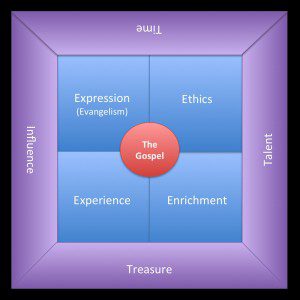What is the why behind your work? Why is the work you do important? Why does it matter to God?
Based on the following statistics, these seem to be questions many of us aren’t sure how to answer
“Over two-thirds (70%) of Christians cannot envision how the work they do serves God. Almost four out of five church-goers (78%) doubt that the work they do is equal in importance to the work of a pastor or priest.” – See more at: http://www.centerforfaithandwork.com/article/gap-between-pulpit-pew-narrowing-read-latest-research#sthash.pxzZFHC3.dpuf
This post is meant to serve as a very densely packed guide to unpacking the divine why behind the daily work you do. It is based on an holistic model of integrating our faith work that is summarized in the following diagram and explained in detail in a prior post: http://www.patheos.com/blogs/marketplacefaith/2015/06/faith-and-work-location-tracking/
I think 20 questions will get you there, they will reveal the underlying purpose behind your work. These questions are not always easy to answer. And the answers may change over time, so revisiting is advised. Despite the difficult and dynamic nature of wrestling with such an intense inquiry, the results are clarity, clarity that seems to be sorely missing.
20 Questions that reveal the why behind your work.
The Experience of Work—This points up the faith element in the day-to-day enterprise in which we are engaged. Three biblical trajectories inform the experience of work, the creative arch, the redemptive arch, and the love of neighbor.
1: How does my work follow the creative arc? How does my work take the resources of creation – people, raw materials, knowledge, energy, etc.- and order these resources for good?
2: How does my daily work follow the redemptive arc? To be redemptive is to rescue or restore, it is to protect, to manage risk, to bring healing. How does you work beat back the disordering effects of the Fall (Genesis 3).
3: How does my daily work benefit my neighbors? Neighbors are those who are near, those who are within our reach. Be creative and brainstorm a broad range of stakeholders; employees, customers, shareholders, vendors, community, and environment.
Enrichment refers to activities that infuse workers with a sense of divine purpose and spiritual support as they engage in their work. Enrichment doesn’t necessarily answer the why question, but is required in order to find and stick with our why.
4: Are my current rhythms providing a strong sense of God’s presence and purpose for my daily life? How does the mix of solitude, scripture, prayer, community, learning, and service need to be modified to maximize my sense of connection?
5: How can I intensify my sense of calling? Calling is the nexus of gifts, experience, opportunity, season, and passion. Do I have have this sense “this is what I was made to do?” If so, what does it look like to leverage that clarity in my approach to my current work.
6: How do the value of my work and my calling drive me to be excellent in my work?
One of the transformative themes of biblical texts on work is that we should do our work with an “all in, whole hearted” attitude. Our drive for excellence being to honor God (rather than merely impress others). What would excellence look like in your daily work? Are you there?
Ethics is a why behind our work at three levels. 1) maintaining the basic legal and ethical code of a given field or industry 2) maintaining exemplary levels of integrity and ethics, and 3) actively pursuing justice—the protection of the marginalized and the reformation of industry praxis.
7: How would I grade myself on my ethical integrity? What would need to change for me to be A+? What deeper transformations need to take place for me to live at the A level?
8: Is there unjust treatment of any of our stakeholders and what am I called to do about it? (Ethics is not just the absence of wrongdoing but a quest for the good.)
9: What systemic forms of injustice are there in my industry that I may be called to fight against?
Expression refers to individuals in the workplace “coming out” as Christian in some way It runs on a continuum from casually relating participation in religious activities to an intentional effort to share one’s faith.
10: Do people in my workplace know I’m a Christian? (Why/Why not/How) As I think about our workplace culture, what is the most appropriate way to raise my flag and identify as a Christ follower?
11: How prepared am I to explain what I believe? What steps do I need to take to be able to explain my faith in a personal and compelling way in my work context.
12: What elements of my workplace persona might diminish from my Christian reputation? Who do I trust could that verify my reputation?
The outer ring of the diagram, the fruit of our work.
Talent—recognized real-world expertise.
13: Are the ways that the skills and capacity I’ve developed in my work could benefit organizations and others outside of my work context?
Treasure—wealth and the capacity to invest in other ventures .
14: What is my plan for giving, for kingdom investing? Do I have goals for the amount and types of giving I feel called to do? Am I helping those I give to be more effective? Are there themes, causes, or organizations to which God is especially drawing me? Do I have a process to handle requests for funds that is gracious and clear?
Time—while there may appear to be an inverse relationship between success and discretionary time, this is not necessarily the case. Effective workers 1) learn how to prioritize their time and 2) have more resources at their disposal to maximize their time.
15: How am I using my discretionary time. Are there causes, organizations, or projects that I should pursue? Are there some I should drop?
Influence—effective work builds social capitol both inside and outside the workplace.
16: How are you using the platform of influence your work provides? Could you be leveraging your networks to enhance nonprofit/church effectiveness, to garner interest in service, and/or to create winsome ways of introducing others to Christ?
17: How is your effectiveness at work providing benefit for your family spiritually, vocationally, relationally, and financially? Think of all the dimensions. What is there current level of balance? How will you adjust the mix?
The Gospel Center:
18: How is the Gospel dealing with the deep, underlying sins and fears that hold you back from full speed faith on the job?
19: How does the Gospel center bring you hope for both the process and outcome of seeking to honor God on your job?
20: As you think about the identify shaping, confidence building, power of the Gospel, how should you prioritize the list of questions above?
The End For Now! I promised dense, I hope I delivered! As we ask questions like the above, God will bring more and more clarity so we can be confident that what we do serves him and is important. Then we’ll know there is a why behind our work.
Which Question do you find 1) most helpful and 2) most challenging?














